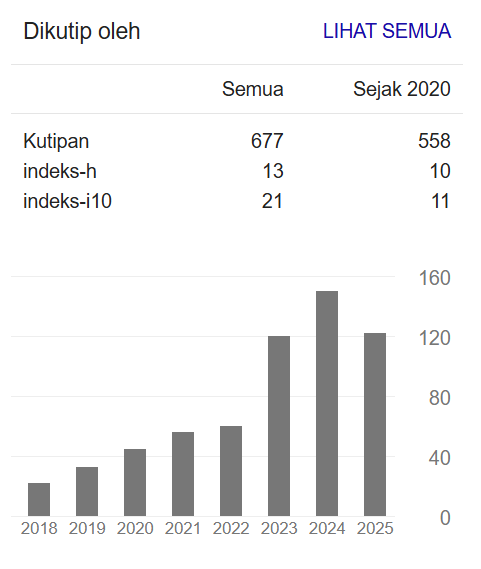PHILOSOPHICAL MESSAGES IN TUHAN MAHA ASYIK NOVEL FOR RELIGIOUS INCLUSIVITY
DOI:
https://doi.org/10.20871/kpjipm.v9i1.271Keywords:
Inclusive, Love, Not Judging, Tuhan Maha Asyik 1-2Abstract
In Indonesia, there has been a religious trend that emphasizes formality and exclusivity. As a result, conflicts among religious communities or groups within a particular religion are often unavoidable. This case certainly requires solutions, including intellectual solutions. This article explores the philosophical messages of the novel, Tuhan Maha Asyik (God is Fun), written by Sujiwo Tejo and MN. Kamba: contribution to their thought is related to religious attitudes; to get the pre-structure that influences their thought. This article is literature-based research with a hermeneutic approach. The main data source is the novel above, while data collection is done through documentation. The data analysis used is the Verstehen technique. The result shows that according to the novel, worshipping God and practicing His teachings should be based on love, doing good to fellow human beings, and not acting in the name of God to judge others; the ideas contribute to educating the mind and attitude of readers to develop inclusivity in religious life; the ideas are built by authors’ educational background, their life, and their religious tradition which ultimately influence their perspective and concept in understanding the issues of divinity and religiosity. This idea is one of the cultural capitals that needs to be internalized in Indonesian society, especially, to strengthen religious moderation and achieve harmonization in diverse lives.
Downloads
References
Athaya, Aufa, and Dewi K. Soedarsono. 2019. ‘Pesan Kegagalan dalam Novel Marchella F.P Melalui Hermeneutika Interpretasi Paul Ricoeur’. Jurnal Ilmiah Komunikasi Makna 7 (2): 23–29. http://dx.doi.org/10.30659/jikm.7.2.23-29%0A%0A.
Aziz, Nasaiy. 2013. ‘Manusia Sebagai Sabyek dan Obyek dalam Filsafat Existentialism Martin Heidegger (Kajian dari Segi Karakteristik dan Pola Pikir Yang Dikembangkan)’. Substantia 15 (2): 252–265. http://dx.doi.org/10.22373/substansia.v15i2.4899.
Bertens, K. 1990. Filsafat Barat Kontemporer : Inggris-Jerman. Jakarta: Gramedia Pustaka Utama.
Braaten, Carl E. n.d. History and Hermeneutics. Philadelphia: The Westminster Press.
Connolly, Michele A. 2019. ‘Antipodean and Biblical Encounter: Postcolonial Vernacular Hermeneutics in Novel Form’. Religions 10 (358): 1–21. https://doi.org/10.3390/rel10060358.
Dafid, Moh. 2020. ‘Analisis Makna Syair Sayang-Sayang Suku Mandar Sulawesi Barat Melalui Pendekatan Hermeneutika’. Jurnal Bahasa dan Sastra 5 (1): 1–17.
Departemen Agama RI. 1993. Al-Qur’an dan Terjemahnya. Jakarta: Indah Press.
Escudero, Jesus Adrian. 2015. ‘Heidegger and the Hermeneutics of the Body’. International Journal of Gender and Women’s Studies 3 (1): 16–25. https://doi.org/10.15640/ijgws.v3n1a3.
Evans, C Stephen. 1982. Philosophy of Religions. England and United State of America. America: Leicester and Intervarsity Press.
Fajri, Daniel Ahmad, and Romel Noverino. 2019. ‘Critique of Ideology Bin George Orwell’s Novel 1984: A Hans-Georg Gadamer’s Hermeneutics Reading’. Journal of Language and Literature 7 (2): 113–26. http://dx.doi.org/10.35760/jll.2019.v7i2.2017.
Firdaus, Rahmat. 2018. ‘Makna Teologi dalam Novel Tuhan Maha Asyik Sudjiwo Tedjo dan Dr. MN.Kamba’. JAQFI: Jurnal Aqidah dan Filsafat Islam 3 (2): 104–124. https://doi.org/10.15575/jaqfi.v3i2.9570.
Gadamer, Hans-Georg. 1975. Truth and Method. New York: The Seabury Press.
Gracia, Jorge J. E. 1995. A Theory of Textuality : The Logic and Epistemology. State University of New York. Albany.
Hardiman, F. Budi. 1991. ‘Hermeneutik, Apa Itu ?’ Basis XL (1): 2–14.
Harvey, Van Austin. 1986. ‘Hermeneutics’. In Encyclopedia of Religion, edited by M. Elliade. London: MacMillan.
Hidayat, Komarudin. 1996. Memahami Bahasa Agama: Sebuah Kajian Hermeneutik. Jakarta: Paramadina.
Jābirī, Muḥammad ‘Ābid al-. 1993. Bunyah Al-‘Aql al-‘Arabīy: Dirāsah Taḥlīliyyah Naqdiyyah li Naẓm al-Ma‘rifah fī Thaqāfah al-‘Arabiyyah. Beirūt: al-Markaz al-Thaqāfī al-‘Arabī.
Kaelan, Kaelan. 2005. Metode Penelitian Kualitatif Bidang Filsafat. Yogyakarta: Paradigma.
Muaz, Abdul. 2020. ‘Hermeneutika dan Mewaktu Bersama Heidegger’. Jurnal Studi Hadis Nusantara 2 (2): 142–152. http://dx.doi.org/10.24235/jshn.v2i2.7647.
Munandar, Siswoyo Aris, and Farida Nurus Sofa. 2020. ‘Maqamat Tokoh Midah dalam Novel Mekkah: Memoar Luka Seorang TKW Karya Aguk Irawan’. Al_Azhar Indonesia Seri Humaniora 5 (3): 146–158. http://dx.doi.org/10.36722/sh.v5i3.388.
Munawir, Achmad Warson. 1984. Kamus Al-Munawwir Arab-Indonesia Terlengkap. Yogyakarta: Pustaka Progressif.
Mustofa, Helmi. 2019. ‘Tarekat Virtual: Gagasan Alternatif Bertarekat Muhammad Nursamad Kamba’. Jurnal Kajian Islam Interdisipliner 4 (2): 163–186. https://doi.org/10.14421/jkii.v4i2.10068.
Nasution, Harun. 1989. Teologi Islam. Jakarta: UI Press.
Oktaviani, Ayu, Suseno, Suseno, and Agus Nuryatin. 2020. ‘Analysis Transformasi Makna Simbolik Mihrab Pada Novel Ke Film dalam Mihrab Cinta Karya Habiburrahman El Shirazy: Kajian Ekranisasi’. Jurnal Sastra Indonesia 9 (1): 78–84. https://journal.unnes.ac.id/sju/index.php/jsi/article/view/18605/10070.
Palmer, Richard E. 1969. Hermeneutics: Interpretation Theory in Schleiermacher, Dilthey, Heidegger and Gadamer. Evanston: Northwestern University Press.
Panikar, Raimundo. 1999. ‘Four Attitudes’. In Philosophy of Religion, edited by G. E. Kessler. California: Wadsworth.
Poespoprodjo, Wasito. 1987. Interpretasi Beberapa Catatan Pandekatan Filsafatinya. Bandung: Remaja Karya.
Riyadi, Arif Riyadi. 2021. ‘Nilai Religius Tuhan Maha Asyik 2 Karya Sujiwo Tejo dan Dr. M. N. Kamba’. Diksatrasia 5 (1): 63–71. http://dx.doi.org/10.25157/diksatrasia.v5i1.6484.
Rumadi, Rumadi. 2012. ‘Islam dan Otoritas Keagamaan’. Walisongo 20 (1): 25–54. https://doi.org/10.21580/ws.20.1.183.
Smythe, Elizabeth, and Deb Spence. 2020. ‘Reading Heidegger’. Nursing Philosophy 21 (2): 1–9. https://doi.org/10.1111/nup.12271.
Sumariyanto, Eko Adhi. 2020. ‘Nilai Moral dalam Novel Al-Ajniḥah Al-Mutakassiroh Karya Kahlil Gibran dan Memang Jodoh Karya Marah Rusli’. Tsaqofiya 2 (2): 84–107. https://doi.org/10.21154/tsaqofiya.v2i2.25.
Sumaryono, E. 1999. Hermeneutik : Sebuah Metode Filsafat. Yogyakarta: Kanisius.
Syafi’i, Muhammad. 2018. ‘Memaknai Ulang Wacana Waria dalam Konteks Indonesia (Analisis Hermeneutika Terhadap Novel Perempuan Tanpa V)’. Refleksi 18 (2): 261–276. https://doi.org/10.14421/ref.2018.1802-07.
Tejo, S., and M.N. Kamba. 2016. Tuhan Maha Asyik 1. Tangerang: Imania.
———. 2020. Tuhan Maha Asyik 2. Tangerang: Imania.
Tim detikcom, Tim. 2020. ‘Profil Nursamad Kamba yang Meninggal Dunia Hari Ini’. Detiknews. 20 June 2020. https://news.detik.com/berita/d-5061642/profil-nursamad-kamba-yang-meninggal-dunia-hari-ini.
Wahid, Muhammad Nur Abdurachman, and Ahmad Shofiyuddin Ichsan. 2020. ‘Makna Pendidikan Tauhid dalam Buku “Tuhan Maha Asyik” Karya Sujiwo Tejo dan Dr. MN.Kamba’. Waniambey: Journal of Islamic Education 1 (2): 27–36.
Wijana, Eleonora Padmasta Ekaristi, and Mutiara Rizka Maulina. 2021. ‘Bingung jika Ditanya Soal Agama, Sujiwo Tejo: Ngaku Islam kok Geer Banget’. Suara.com. 22 January 2021. https://jogja.suara.com/read/2021/01/22/140508/bingung-jika-ditanya-soal-agama-sujiwo-tejo-ngaku-islam-kok-geer-banget.
Downloads
Published
How to Cite
Issue
Section
License
Copyright (c) 2023 Ulya Ulya

This work is licensed under a Creative Commons Attribution 4.0 International License.





























